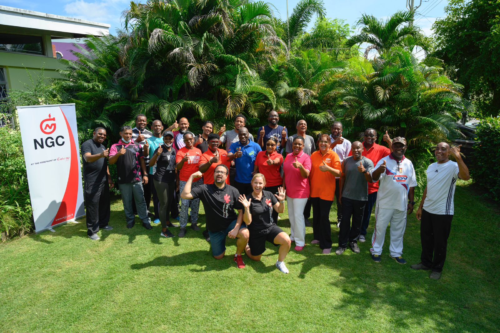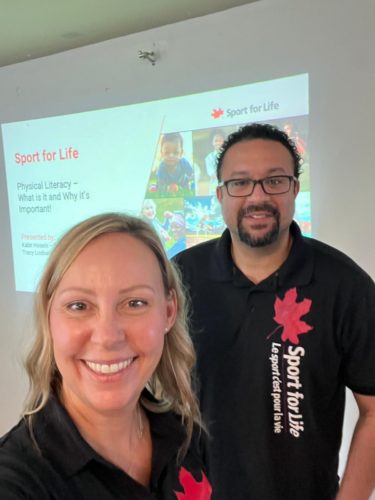
For most people in Trinidad and Tobago, physical literacy is still a foreign concept – it’s only in recent years that it became part of their national conversation, thanks primarily to the Caribbean Association of National Olympic Committees (CANOC) and the National Gas Company. But now the entire country is about to be introduced to it, as the country’s Ministry of Education has made the lofty goal of introducing physical literacy leaders into all 403 of the schools in their dual-island nation.
One of the first steps in that process was kicked off in December, when Sport for Life facilitators Kabir Hosein and Tracy Lockwood flew down to the Caribbean to host three days of training with educators and coaches who were already proficient in physical activity instruction. Their role was to train this group as physical literacy leaders, giving them the necessary skills and resources to train others and access to the physical activity curriculum platform PLAYBuilder.
“It being my home country, I shouldn’t be surprised, but it was heartwarming how the concepts connected with each teacher or coach who had their own unique operating environment, and their own unique challenges,” said Hosein.
“Everyone in the room was highly trained, they were already experienced coaches. But seeing these practical, easy examples on how to bring it all together, which is what physical literacy is, really blew their mind.”
As the owner of PLAY Education and through Sport for Life, Lockwood has facilitated thousands of trainings and workshops as an education consultant and physical literacy specialist. The energy and positivity that the Trinibagonians brought to this three-day training had a special flavour for her, especially because she’d never been to the country before.
“There are groups that just bring the energy at the right moment and at the right place. This was one of those groups,” she said, noting that representatives from Trinidad and Tobago’s Ministry of Education were on hand to see them learn, work, and play.
“It felt great to bring like-minded people together, who were motivated to learn, then share with others after the training was complete. I found it very fulfilling and rewarding to see how everyone interacted with each other through open conversations, classroom group work, and outside activities. During some of the activities, I had to remind them that ‘this is just a game, which was hilarious but not surprising as their competitive nature sometimes came out.”
‘The conversations surprised me’
The National Gas Company of Trinidad and Tobago was already involved in funding programs for the country’s education system before they became interested in addressing sedentary behaviour. They were searching for contractors to help them address this particular issue within the school system, and that’s where Sport for Life came in.
“This is probably a first, where it’s the funder wanting to make this happen. Usually it’s recreation, education or sport facing the challenge of trying to find funding, but in this instance it’s the funder who wants to do it and their challenge is getting it delivered,” said Hosein.
Trinidad and Tobago is facing a number of unique challenges when it comes to keeping its populace active and healthy, as Lockwood learned through her conversations with the participants. Because of high levels of rain during half the year, children can’t go outside, and gyms are extremely rare.
“We also heard that teachers don’t have a clear understanding of physical literacy and often don’t value the importance of physical education, making these physical literacy leaders that much more important,” she said.

“Some of the conversations with the participants surprised me. For instance, I learned that the infrastructure for physical activity and physical education programming is minimal. There is often no space in schools, such as gymnasiums and large fields, for students to receive a consistent and quality program. Families spend a lot of time in their vehicles sitting in traffic, adding to the sedentary behaviours that already exist.”
To assist participants with leading activities in small spaces, since this is what they will likely see in schools, the training took them through activities that can be taught in classrooms and small outdoor areas.
“We also talked about ideas for getting students moving and developing physical literacy in different settings. Sensory pathways, for example, can be created in school hallways and many activities can be played in the classroom. Some of these activities that participants experienced during training can be connected to other subjects, making the learning come alive!”
She also discussed with them how to make the most of their break time.
“Recess is another setting that was discussed and resources were shared. Knowing about the infrastructure of school settings in Trinidad and Tobago, I really think more time could be spent on ways to get kids moving in small spaces.”
The third pillar of education
As physical literacy catches on in Trinidad and Tobago, one of the figures encouraging this culture change is CANOC president Keith Joseph, who was recently quoted saying “our leaders seem incapable of moving beyond numeracy and literacy as the fundamental pillars of education. The truth is that without physical literacy, we are incapable of developing into a whole person.”
He also called physical literacy “the third pillar of education”.
For Hosein, who previously worked with CANOC before emigrating to Canada with his family, it’s been emotional to watch his home country recognize the importance of physical literacy and start to introduce it into their system.
If all goes to plan, physical literacy will become an integral part of the primary school curriculum in Trinidad and Tobago – resulting in more students moving more often. This means Sport for Life and its partners need to continue training the hundreds of teachers that it’s going to require to pull this feat off.
“We would like to be continuously involved in empowering the physical literacy leads in the primary schools,” Hosein said.
“Trinidad and Tobago celebrated 60 years of Independence last year so as the country evolves physical literacy can be that catalyst to spur behavioral change so that as a nation everyone flourishes in life.”
